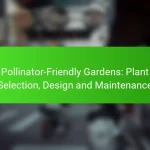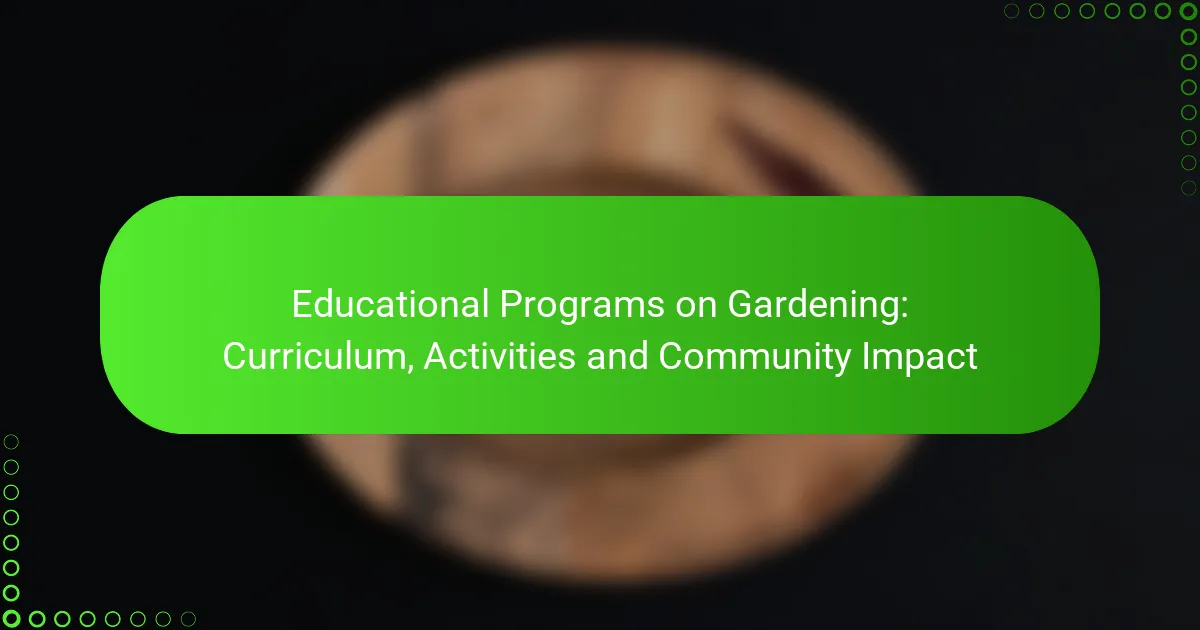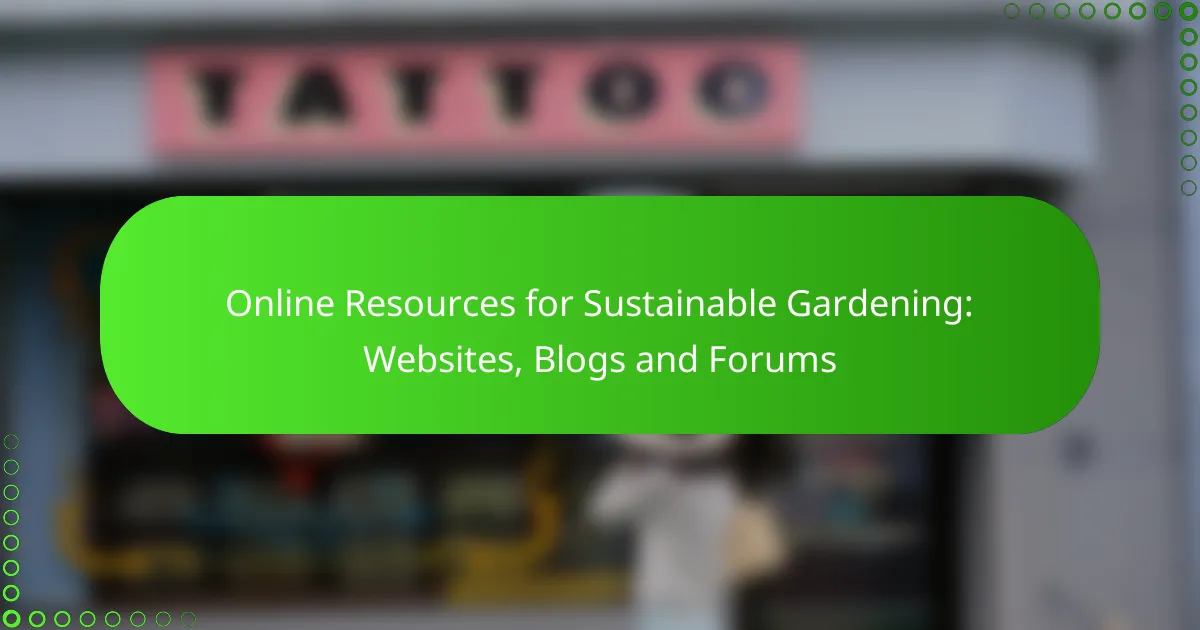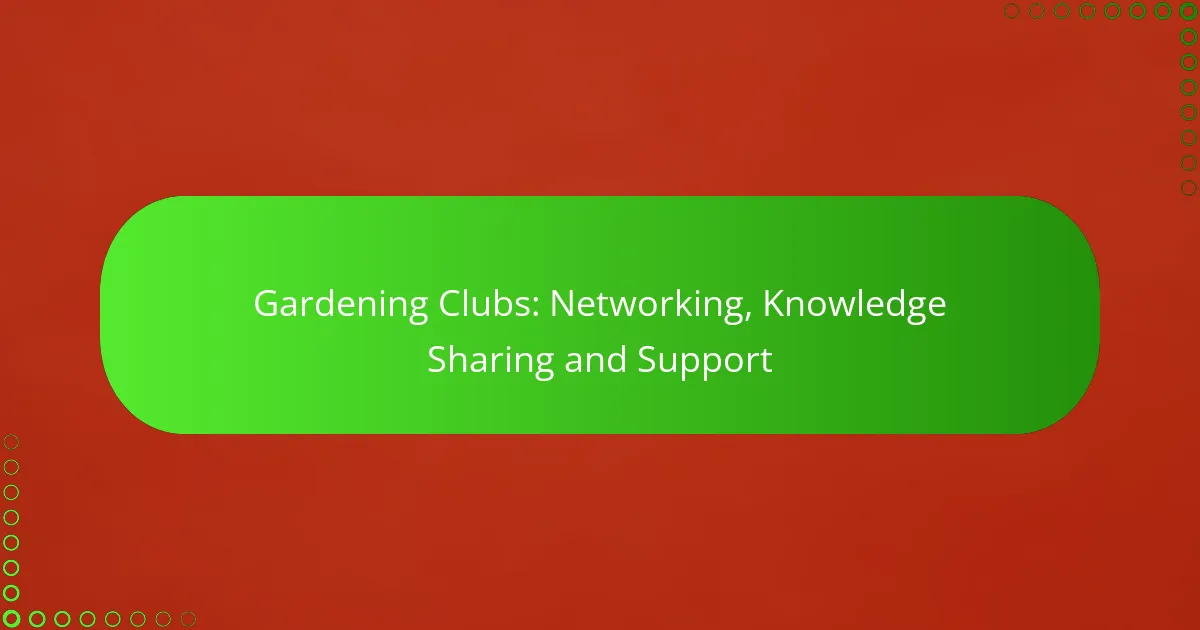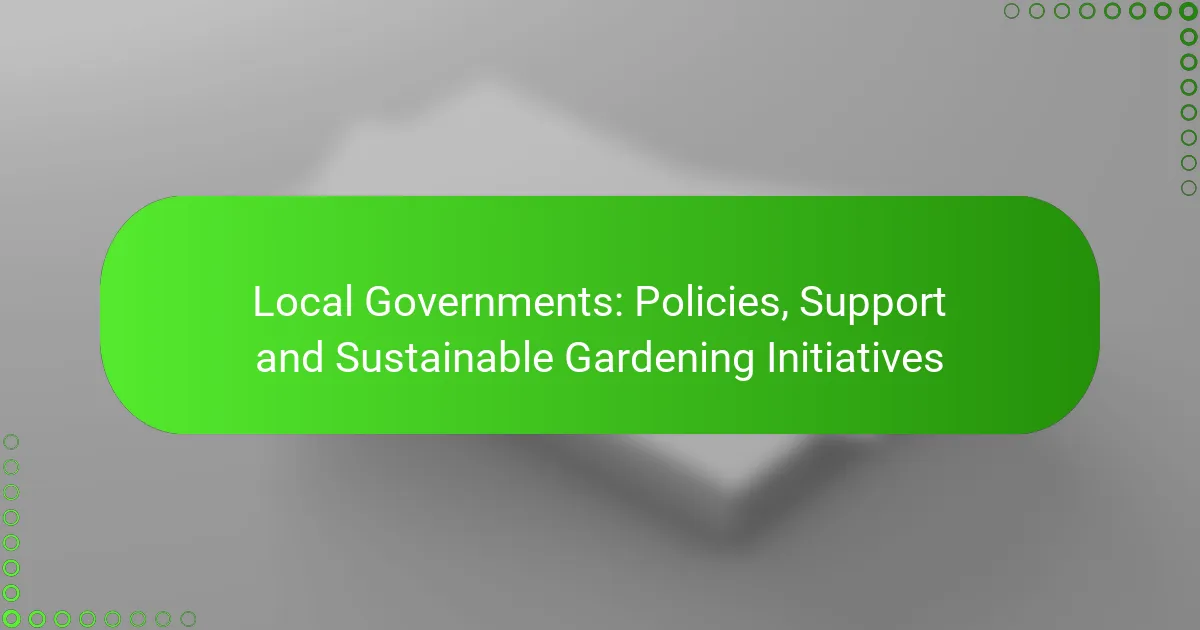Educational gardening programs in South Africa are designed to promote sustainable practices and enhance food security through a variety of initiatives, including community projects and online courses. These programs engage participants with hands-on activities such as planting workshops and soil health education, fostering both practical skills and environmental stewardship. By encouraging collaboration and social interaction, these initiatives significantly impact local communities, providing access to fresh produce and strengthening community ties.
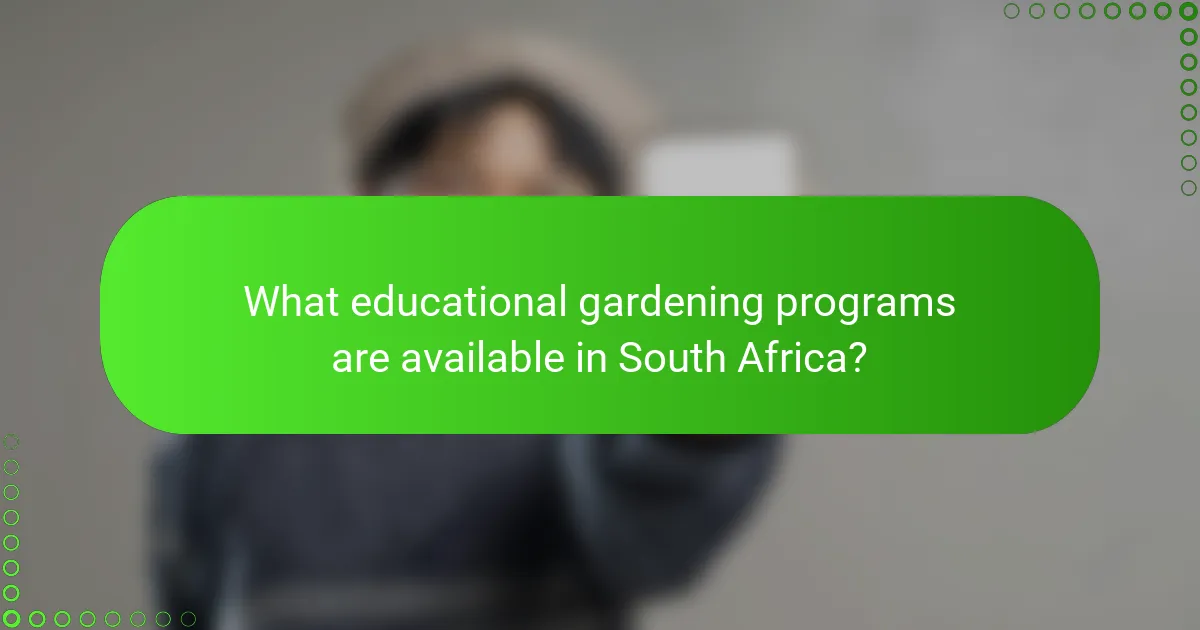
What educational gardening programs are available in South Africa?
South Africa offers a variety of educational gardening programs that cater to different interests and skill levels. These programs include community initiatives, university certificate courses, and online learning options, all aimed at promoting sustainable gardening practices and enhancing food security.
Community Gardening Initiatives
Community gardening initiatives in South Africa focus on bringing people together to cultivate shared spaces. These programs often provide hands-on training in organic gardening, permaculture, and sustainable practices, fostering a sense of community and collaboration.
Participants typically engage in planting, maintaining, and harvesting crops, which can lead to improved nutrition and food access. Local organizations may offer resources such as seeds, tools, and workshops to support these initiatives.
University Certificate Programs
Several South African universities offer certificate programs in gardening and horticulture, designed for those seeking formal education in the field. These programs often cover topics such as plant biology, soil management, and landscape design.
Courses may range from a few months to a year, combining theoretical knowledge with practical experience. Graduates can pursue careers in agriculture, landscaping, or environmental management, contributing to the country’s growing green economy.
Online Gardening Courses
Online gardening courses provide flexible learning opportunities for individuals across South Africa. These courses typically cover a wide range of topics, from basic gardening techniques to advanced sustainable practices.
Participants can learn at their own pace, accessing video tutorials, interactive forums, and downloadable resources. Many platforms offer affordable options, making it easy for anyone interested in gardening to enhance their skills from home.
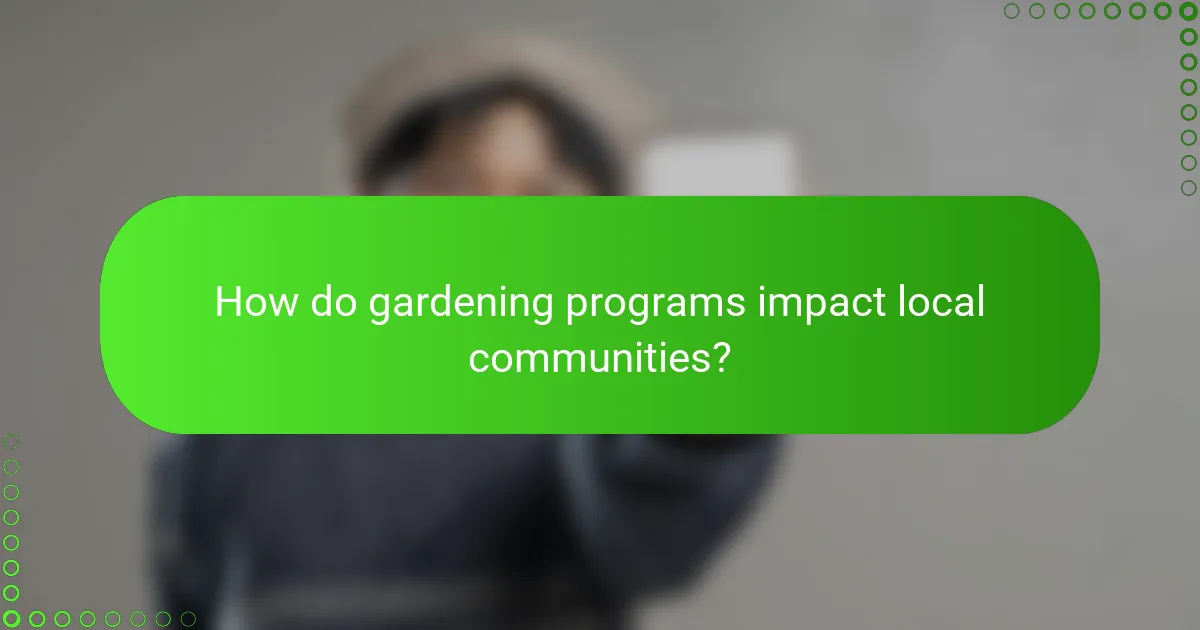
How do gardening programs impact local communities?
Gardening programs significantly enhance local communities by promoting food security and fostering community engagement. These initiatives not only provide access to fresh produce but also encourage collaboration and social interaction among residents.
Improved Food Security
Gardening programs contribute to improved food security by enabling communities to grow their own fruits and vegetables. This access to fresh produce can reduce reliance on grocery stores, particularly in areas classified as food deserts, where healthy food options are limited.
Community gardens often allow participants to cultivate a variety of crops, which can lead to a more diverse diet. For example, a small community garden can yield enough produce to supplement the diets of several families, providing them with essential nutrients and reducing grocery expenses.
Enhanced Community Engagement
Gardening programs enhance community engagement by bringing people together for a common purpose. Participants often collaborate on garden maintenance, share gardening tips, and organize events, fostering a sense of belonging and community pride.
Additionally, these programs can serve as educational platforms, where community members learn about sustainable practices and environmental stewardship. Workshops on composting, pest management, and seasonal planting can empower individuals with knowledge that benefits both their gardens and the broader community.
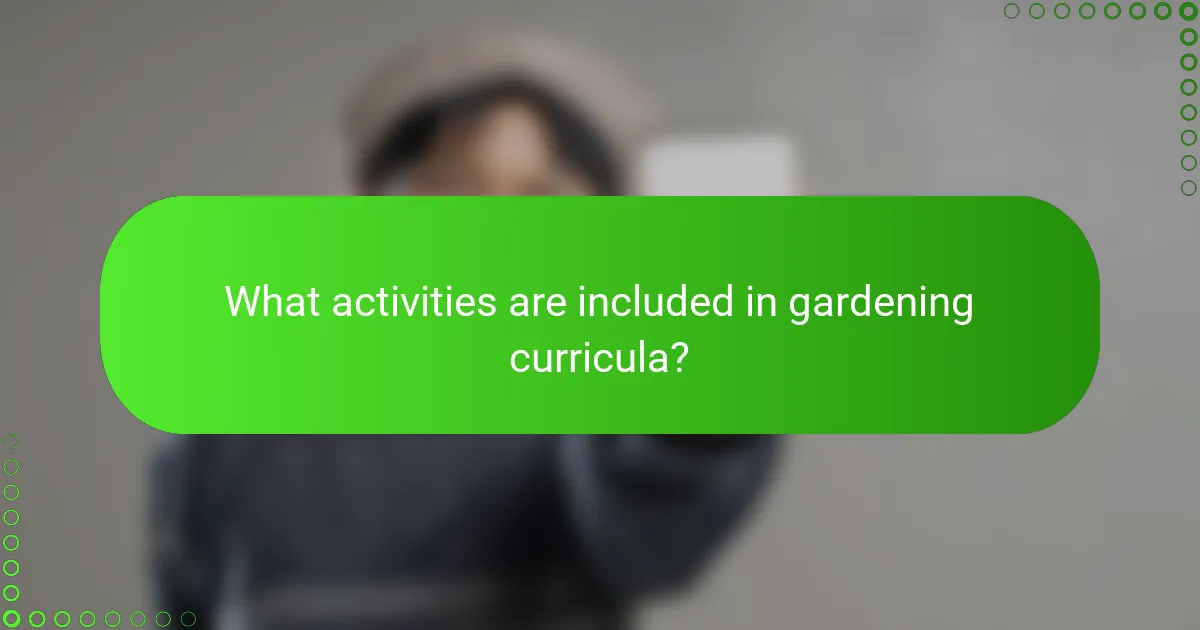
What activities are included in gardening curricula?
Gardening curricula typically encompass a variety of activities designed to engage participants in practical learning and environmental stewardship. These activities often include hands-on planting workshops, soil health education, and composting techniques, each contributing to a comprehensive understanding of sustainable gardening practices.
Hands-on Planting Workshops
Hands-on planting workshops are essential components of gardening curricula, allowing participants to directly engage with the planting process. These workshops often cover seed selection, planting techniques, and seasonal timing, providing practical experience that enhances learning.
During these sessions, participants may plant a variety of crops, from vegetables to flowers, which can be tailored to local climate conditions and growing seasons. This experiential learning fosters a deeper connection to the gardening process and encourages participants to cultivate their own gardens at home.
Soil Health Education
Soil health education is critical in gardening programs, as healthy soil is the foundation for successful gardening. Participants learn about soil composition, nutrient cycles, and the importance of microorganisms, which all contribute to plant growth.
Workshops may include practical demonstrations on soil testing and amendments, helping gardeners understand how to improve their soil quality. Emphasizing local soil types and conditions ensures that participants can apply this knowledge effectively in their own gardening efforts.
Composting Techniques
Composting techniques are a vital part of sustainable gardening education, teaching participants how to recycle organic waste into nutrient-rich soil amendments. These sessions often cover the basics of composting, including materials to use, layering methods, and maintenance practices.
Participants may engage in hands-on activities, such as setting up a compost bin or pile, which reinforces the principles of waste reduction and soil enrichment. Understanding composting not only benefits individual gardens but also contributes to broader community sustainability efforts by reducing landfill waste.
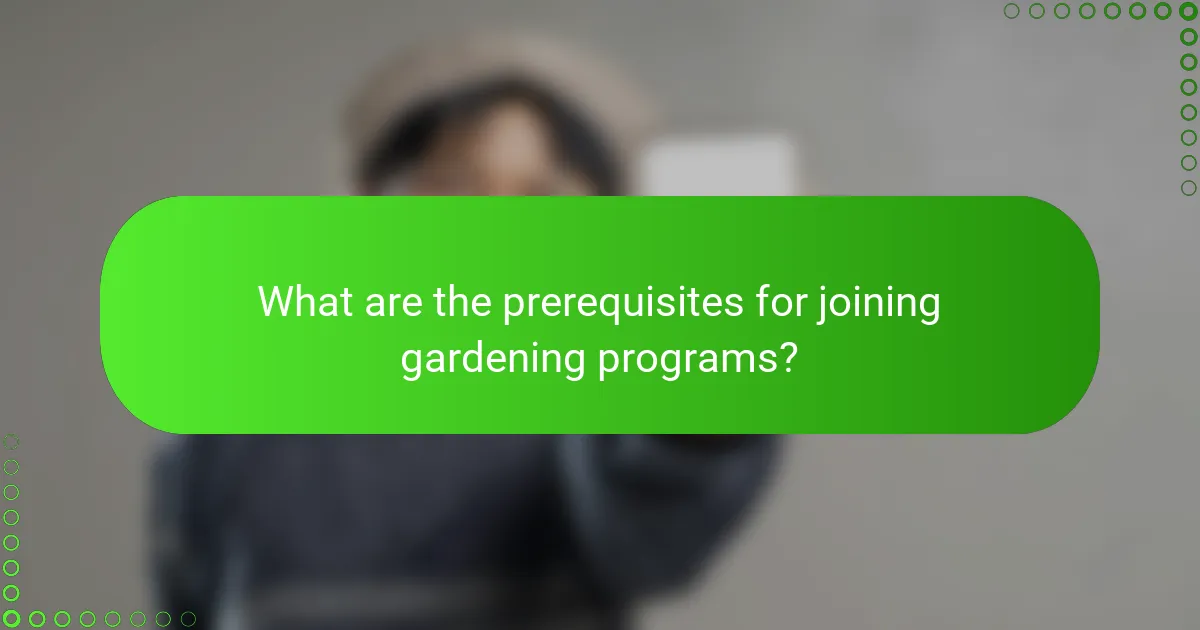
What are the prerequisites for joining gardening programs?
Joining gardening programs typically requires a basic understanding of gardening principles and a willingness to engage in community service. Participants should be prepared to learn and contribute actively to the program’s goals.
Basic Gardening Knowledge
Basic gardening knowledge includes understanding plant types, soil health, and seasonal planting schedules. Familiarity with local climate conditions and common pests can also enhance the gardening experience.
Prospective participants can benefit from introductory courses or workshops that cover essential topics like seed selection, watering techniques, and organic gardening practices. Many community programs offer resources or mentorship to help newcomers build their skills.
Commitment to Community Service
A commitment to community service is crucial for those joining gardening programs, as these initiatives often aim to improve local environments and foster community spirit. Participants should be ready to dedicate time to group projects and outreach activities.
Engagement can vary from regular volunteer hours to participation in community events, such as farmers’ markets or educational workshops. Understanding the program’s goals and being proactive in contributing can significantly enhance the impact of the gardening efforts.

How to choose the right gardening program?
Choosing the right gardening program involves evaluating your personal goals, the expertise of instructors, and the program’s location and accessibility. These factors will help ensure that the program aligns with your interests and needs.
Assessing Program Goals
Start by identifying what you want to achieve from the gardening program. Are you looking to grow vegetables, learn about sustainable practices, or enhance your landscaping skills? Knowing your objectives will help you select a program that aligns with your aspirations.
Different programs may focus on various aspects of gardening, such as organic methods, permaculture, or ornamental gardening. Review the curriculum to see if it covers the topics that interest you most, and consider whether the program offers hands-on experience or theoretical knowledge.
Evaluating Instructor Expertise
The qualifications and experience of instructors can significantly impact your learning experience. Look for programs led by certified horticulturists or experienced gardeners who have a strong background in the specific areas you want to explore.
Check if the instructors have practical experience in gardening and teaching. Reading reviews or testimonials from past participants can provide insights into their teaching style and effectiveness.
Considering Location and Accessibility
Location plays a crucial role in your ability to participate in a gardening program. Consider whether the program is offered in-person or online, and if in-person, how far you are willing to travel. Programs located in urban areas may have different focuses compared to those in rural settings.
Accessibility is also important; ensure that the program venue accommodates individuals with disabilities if necessary. Additionally, check the schedule to see if it fits your availability, as some programs may require a significant time commitment.
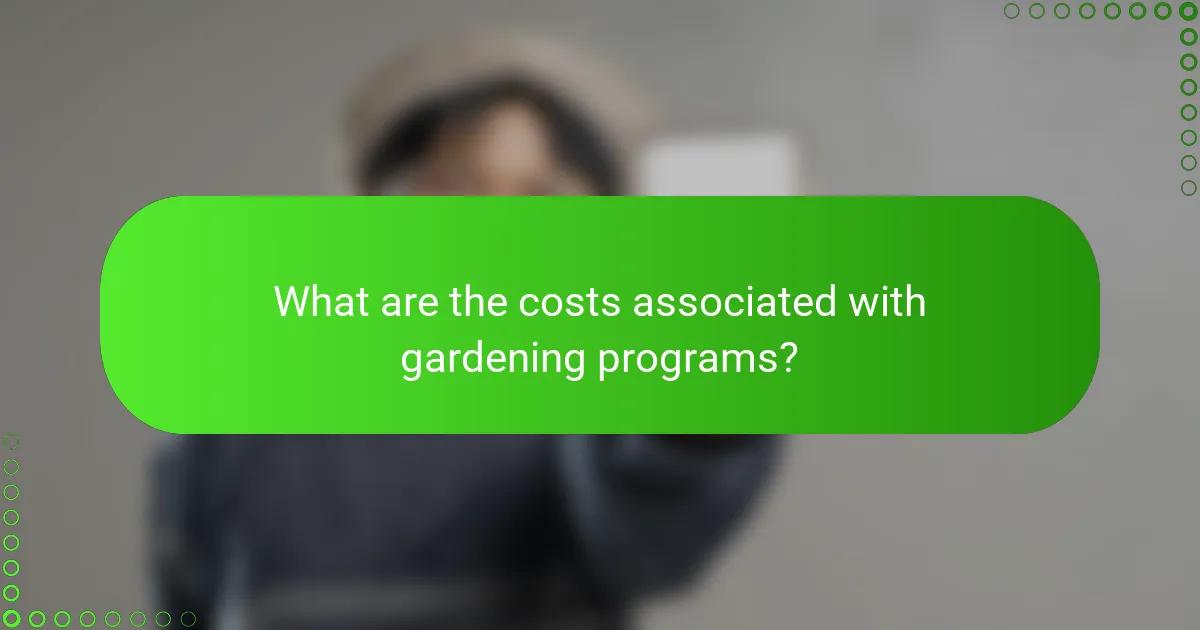
What are the costs associated with gardening programs?
The costs associated with gardening programs can vary significantly based on location, type of program, and the resources provided. Generally, participants should consider tuition fees, materials, and supplies when budgeting for these educational initiatives.
Tuition Fees for Courses
Tuition fees for gardening courses can range from low tens of USD for community workshops to several hundred USD for more comprehensive programs at educational institutions. Some programs may offer scholarships or sliding scale fees based on income, making them more accessible.
When evaluating tuition costs, consider the duration and depth of the course. Short workshops may provide basic skills, while longer courses often cover advanced techniques and include hands-on experience.
Materials and Supplies Costs
Materials and supplies costs for gardening programs can vary widely, typically ranging from a few dollars for basic tools to several hundred dollars for specialized equipment and seeds. Participants should budget for items such as soil, fertilizers, seeds, and gardening tools.
To minimize expenses, consider purchasing materials in bulk or sharing resources with fellow participants. Additionally, some programs may provide necessary supplies as part of the tuition, so it’s essential to clarify what is included before enrolling.
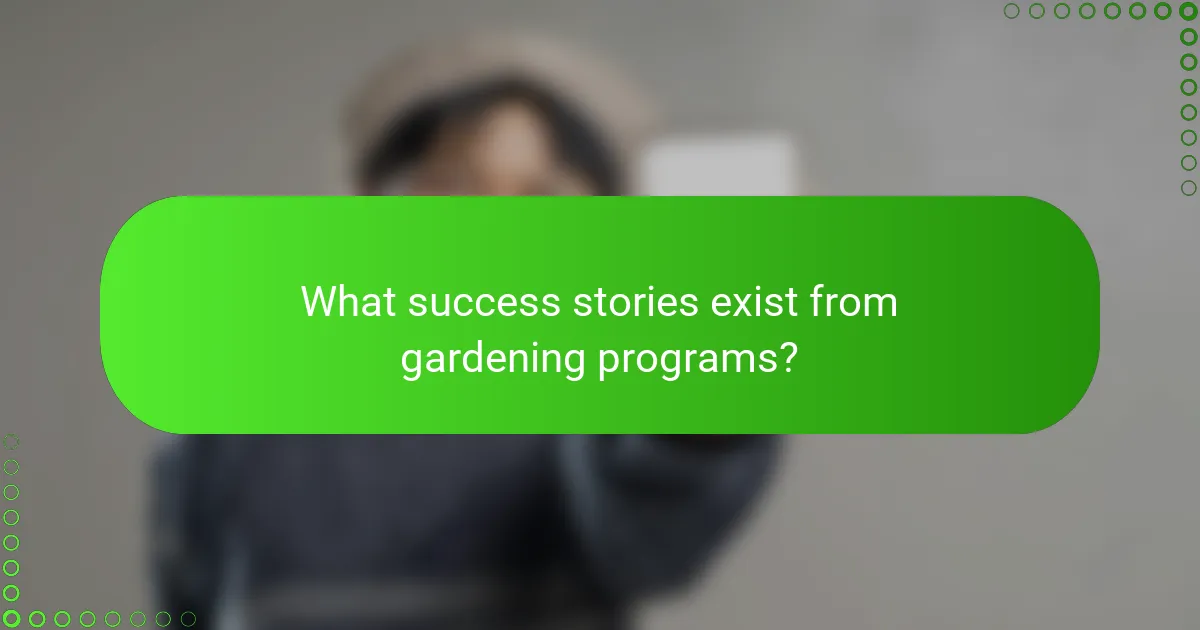
What success stories exist from gardening programs?
Gardening programs have led to numerous success stories, showcasing their positive impact on communities and individuals. These initiatives often improve food security, enhance community engagement, and promote environmental sustainability.
Case Study: Urban Farming in Johannesburg
In Johannesburg, urban farming initiatives have transformed vacant lots into productive gardens, providing fresh produce to local residents. These programs not only address food deserts but also create job opportunities and foster community spirit.
Participants in these urban farms learn essential skills such as crop rotation, pest management, and sustainable practices. Workshops and hands-on training sessions help individuals gain confidence and knowledge, which they can apply in their own gardens or share with others.
One notable example is the Soweto Urban Agriculture Initiative, which has successfully engaged hundreds of community members. By focusing on local needs and resources, these programs have demonstrated the potential of urban farming to create lasting change in Johannesburg.





